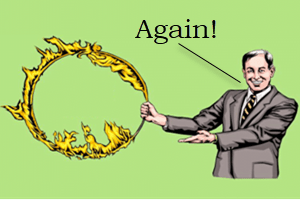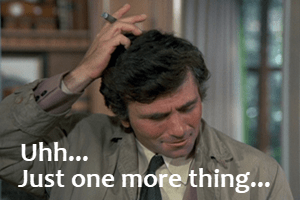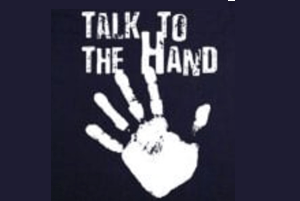Question
I had a coffee with a potential manager in his company café and we discussed my past and current experience but it wasn’t referred to as an interview. It lasted 1.5 hours. The final 30 minutes were with his manager, who dropped by.
I never applied for a job and never shared my resume. We connected on LinkedIn and arranged the coffee through LinkedIn messages. I know he has a job opening (and one more coming up) and he confirmed that in our coffee chat, but he didn’t explicitly say the chat was an interview for the job opening, so I am wondering how I can follow up without sounding like I am bluntly following up on a formal interview. I’d like to get feedback and want to know what next steps are. Should I send him my resume and ask whether he would consider me as a candidate?
Nick’s Reply
 Don’t ask whether you’re a candidate. Tell him that he’s a candidate to be your boss.
Don’t ask whether you’re a candidate. Tell him that he’s a candidate to be your boss.
This is the best kind of interview. It sounds promising, but we just don’t know whether it’s for one of the two jobs you mentioned or for something in the future.
Give the manager a signal
While you’re worried this “non-interview” may lead nowhere, the manager may be waiting for you to tell him what’s next. Many managers look for something few candidates ever display: motivation and desire for the job.
Having the right skills and experience is important, but I find that the best managers won’t make a hire unless they see clear indications a person really wants to work for them. Motivation is at least as important as skills, which can be taught. The amount of time the manager spent with you is a strong positive signal — so signal back to him.
I want the job
Use your own best judgment, of course, but I think a simple e-mail is best, confirming your enthusiasm and motivation. For example:
How to Say It
“Thanks for the good conversation last week and for all you shared about your department (and for the coffee!). I’m impressed, and I want you to know that based on what I learned, I’d be very interested in joining your team if an appropriate position is open. You’re the kind of manager I want to work for. Thank you for spending so much time with me.”
Very few candidates ever come out and tell a manager “I want to be on your team!” yet that’s what any good manager wants to hear – a commitment! What I’m suggesting is a very clear expression of interest without being pushy. I would not send a resume. If he wants it, he’ll ask for it.
Show even more enthusiasm
If you want to go a bit further in showing your enthusiasm, find a really good article that addresses an issue that was discussed during your meeting. Attach it to your e-mail along with a couple of comments about why the manager may find it helpful. Show that you’re already thinking like an employee.
When you make yourself this clear, you need not do anything else. The next move is the manager’s. Don’t keep pestering for a response. While you wait, the best next step for you is to move on to your next opportunity and pursue it the same way.
Nice work getting a meeting that’s better than an interview! You had a conversation driven by your interests and the manager’s — not by an “HR script.” Whatever you decide, please let me know how this turns out. I hope something I’ve said is helpful.
(For more on the topic, check this article.)
Why do you think the manager invited the reader for coffee? Was this a job interview or something else? How should this reader follow up? Is “I want the job” the right message?
: :




 (In this column, I will use ChatGPT as a catch-all term for all generations and competing products of the underlying technology, because this is not an analysis of the technology itself.)
(In this column, I will use ChatGPT as a catch-all term for all generations and competing products of the underlying technology, because this is not an analysis of the technology itself.)
 I’m glad to hear my suggestions helped you win a new job and resign an old one – I love to hear success stories. You’re welcome, and thanks for your very kind words. Congratulations on getting two offers! Nowadays that’s quite an accomplishment.
I’m glad to hear my suggestions helped you win a new job and resign an old one – I love to hear success stories. You’re welcome, and thanks for your very kind words. Congratulations on getting two offers! Nowadays that’s quite an accomplishment.
 When the rules of interviewing don’t work, agile job applicants change the rules. I’ll tell you the story of a job seeker I met during an intense 1-hour
When the rules of interviewing don’t work, agile job applicants change the rules. I’ll tell you the story of a job seeker I met during an intense 1-hour 
 When you walk into a restaurant because you want maple-glazed salmon, do you think the chef runs out to go fish for your salmon while the sous chef taps a couple of maple trees? My guess is the restaurant developed ready sources of ingredients long before it needed them, because planning ahead is good.
When you walk into a restaurant because you want maple-glazed salmon, do you think the chef runs out to go fish for your salmon while the sous chef taps a couple of maple trees? My guess is the restaurant developed ready sources of ingredients long before it needed them, because planning ahead is good.
 Sometimes stress pushes us to our limits. Sometimes it pushes us beyond. You’re right, you shouldn’t have quit without notice — or without first discussing your problems candidly with your boss. You will never know whether he might have adjusted your work load.
Sometimes stress pushes us to our limits. Sometimes it pushes us beyond. You’re right, you shouldn’t have quit without notice — or without first discussing your problems candidly with your boss. You will never know whether he might have adjusted your work load.
 I recently applied for a Senior Sales position for a medical device supplier, having 15 years of national experience in health industry sales across Australia and New Zealand. The employment hoops they expect me to jump through are bizarre. The employer requires all applicants to pass an outsourced online “assessment test.” This is completed in the local office or remotely with a junior HR person monitoring to ensure the applicant is not cheating.
I recently applied for a Senior Sales position for a medical device supplier, having 15 years of national experience in health industry sales across Australia and New Zealand. The employment hoops they expect me to jump through are bizarre. The employer requires all applicants to pass an outsourced online “assessment test.” This is completed in the local office or remotely with a junior HR person monitoring to ensure the applicant is not cheating.
 I know you’re referring to the controversy in the labor market about whether job descriptions that specify a college degree actually require one to do the job. Is the degree really necessary? But let’s get underneath that: What can an employer — whether government or commercial — rely on to make a sound hiring judgment?
I know you’re referring to the controversy in the labor market about whether job descriptions that specify a college degree actually require one to do the job. Is the degree really necessary? But let’s get underneath that: What can an employer — whether government or commercial — rely on to make a sound hiring judgment?
 You’re not alone.
You’re not alone.
 Many years ago I worked for a time at a small, nimble, regional technology company. We were successful because our managers and employees were very smart, hardworking and highly competitive. There were no NCAs. Until a bigger, national company bought us out.
Many years ago I worked for a time at a small, nimble, regional technology company. We were successful because our managers and employees were very smart, hardworking and highly competitive. There were no NCAs. Until a bigger, national company bought us out.